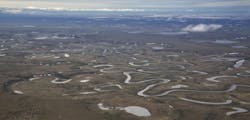Biden administration places 13 million NPR-A acres off limits to drilling
The Biden administration on Apr. 19 banned oil and gas drilling on 13.3 million acres in the National Petroleum Reserve–Alaska (NPR-A) on Alaska’s North Slope.
The US Interior Department’s long-awaited final rule puts nearly half of NPR-A’s 23 million acres off limits to new oil and gas leasing.
“I am proud that my Administration is taking action to conserve more than 13 million acres in the Western Arctic and to honor the culture, history, and enduring wisdom of Alaska Natives who have lived on and stewarded these lands since time immemorial,” President Joe Biden said in a statement. He said the decision was part of his administration’s push to “meet the urgency of the climate crisis.”
In the final rule, Interior’s Bureau of Land Management (BLM), which manages NPR-A, said the “majority of the area closed to oil and gas drilling was determined to be medium or low potential for discovery or development of oil and gas resources.”
The move follows the administration’s decision last spring to approve ConocoPhillips’ 600 MMboe Willow oil project in NPR-A, an action that drew the ire of environmental groups and many native tribes (OGJ Online, Mar. 13, 2023).
The oil industry, Alaska’s congressional delegation, and native tribes blasted the latest decision.
Dustin Meyer, senior vice-president for policy at the American Petroleum Institute called the rule “another step in the wrong direction,” particularly as “the world is looking for American energy leadership.”
“This misguided rule from the Biden Administration sharply limits future oil and natural gas development in Alaska’s National Petroleum Reserve, a region explicitly intended by Congress to bolster America’s energy security while generating important economic growth and revenue for local Alaskan communities,” Meyer said in a statement.
Sen. Lisa Murkowski (R-Alas.) called the move “more than a one-two punch to Alaska.”
Sen. Dan Sullivan (R-Alas.), during a press conference Apr. 18 with other Republican lawmakers, said the administration was sending a message to “dictators in Iran, China, and Russia” that the US will not “use our resources to strengthen our country, but you can use your resources to strengthen your country.”
Voice of the Arctic Inupiat (VOICE) said indigenous elected leaders from Alaska’s North Slope are unified in their outrage over the decision.
“The federal government has again excluded the Indigenous North Slope Inupiat from policymaking by issuing a final rule for the NPR-A that does not reflect our communities’ wishes,” said VOICE president Nagruk Harcharek. “[T]he final NPR-A rule will hurt the very residents the federal government purports to help by rolling back years of progress, impoverishing our communities, and imperiling our Iñupiaq culture.”
The group said that over 95% of the North Slope’s tax revenue is derived from taxation on resource development infrastructure.
Environmental groups hailed the news. “This is a major victory for the communities and wildlife of Arctic Alaska. Oil and gas drilling in the Western Arctic isn’t just incompatible with the long-term survival of those who rely on these landscapes,” said Sierra Club executive director Ben Jealous.
Beaufort Sea
BLM is also withdrawing some 2.8 million acres of the Beaufort Sea, ensuring the entire US Arctic Ocean is off limits to new oil and gas leasing.
“With these new announcements, the Biden-Harris administration has now protected more than 41 million acres of lands and waters across the country, said John Podesta, senior advisor to the President for International Climate Policy.
About the Author
Cathy Landry
Washington Correspondent
Cathy Landry has worked over 20 years as a journalist, including 17 years as an energy reporter with Platts News Service (now S&P Global) in Washington and London.
She has served as a wire-service reporter, general news and sports reporter for local newspapers and a feature writer for association and company publications.
Cathy has deep public policy experience, having worked 15 years in Washington energy circles.
She earned a master’s degree in government from The Johns Hopkins University and studied newspaper journalism and psychology at Syracuse University.
